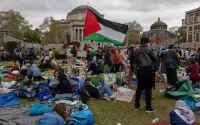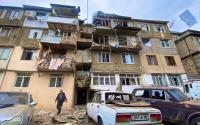It's not hard for an Iraqi to become schizophrenic... it's a national disease
17 December 2003The Independent
Al-Adil is is as good a place as any in Baghdad to understand the meaning of occupation. And fear. And betrayal. It's a leafy little road, middle-class in an Iraqi way, educated families living in villas shadowed by palm trees. But when I drove past, the 82nd Airborne were paying a social call with two M1A1 Abrams tanks and six Humvees and a company of soldiers and - here was the rub - a group of armed and hooded men.
I wandered up to them with my blue school satchel over my shoulder; the satchel has a cooling effect on gunmen and soldiers and the first masked man waved me forward with two fingers. Iraqi, I asked? And he nodded.
Just behind him, the Americans from Charlie Company were handing out leaflets. One bore a digitalised colour photograph of the Sheraton and Palestine hotels exploding in a blaze of golden fire. ""$2,500 [£1,400] reward for information on those who attacked the hotels"" was written at the top.
The hotels were not blown to pieces last month, but a set of rockets was fired at them, badly wounding an American in the Palestine. On the back of the leaflet, there was a coloured photograph of a bearded man lying on the ground while a soldier tied his hands behind his back - not exactly the sort of image that is going to produce informers.
An Iraqi interpreter for the US forces, his bespectacled face cowled in an Arab kaffiyeh scarf, showed me a photocopy of a bearded man dancing at what must been a wedding, his hands held aloft, grinning at the camera. ""We are looking for him,"" the interpreter said. Several middle-aged men looked at the picture and shrugged their shoulders. The American soldiers were weighed down with flak jackets and helmets and rifles and they were trying to be friendly. They had learnt some basic Arabic and were saying shukran - thank you - each time they finished speaking to the locals.
At the gateway of a single-storey villa I found a man in a long grey jallabia gown. ""They are polite,"" he said. ""They are looking for men who have attacked them. But they have also been asking about the sewage system here and asking if we have enough electricity. They have caused no problems.""
At which point a group of young men joined us beneath the trees and the man in the gown transmogrified into someone else. ""The Americans dragged a sick man from his home here and they threw him in a truck and one of the Americans put his foot on the man's back - such humiliation - and then they drove him away. The Americans behave like barbarians.""
I could see what was happening. My informant was being watched by the hooded gunmen who worked for the Americans, and also by men who - if they weren't members of the resistance - were certainly sympathetic. I saw one of them tearing up an American leaflet. So the Iraqi now had two faces. He was friendly to the Americans and he hated them. He spoke of American politeness and American cruelty, all in the space of 30 seconds.
In Al Adil, it was not difficult for an Iraqi to adopt schizophrenia. It's a national disease.
There was an Airborne sergeant listening to all this, uncomprehending but happy enough to talk to the Englishman with the school satchel. He couldn't stop laughing when I asked if any of his men wrote war poetry. ""I don't think my Engineer boys are into that kind of thing,"" he said in disbelief. He was wrong - several of them did. But he wanted me to talk to his company commander whom I found in the next street, climbing out of a Humvee with a big American flag in the front window.
Captain Joseph Eskindo was a bright, articulate man - thank God America's junior officers are more forthcoming than their generals - and he wanted to talk.
""We've had some attacks here on the Iraqi police,"" he said. ""They are having a harder time than us. One was killed close to here and we want to find the people who did it."" And the masked men, some of whom had dark blue helmets and jungle fatigues that looked like Bangladesh army uniforms, stood behind us. ""They're the Iraqi Civil Defence Corps, they're locals and they don't want to be recognised. We take them with us to areas they don't live in but there's always a chance someone will know them, which is why they hide their faces.""
And all the while, leaflets were being handed to every householder in Al-Adil, one of which caught my eye. It showed photographs of a heavy machine-gun, a rocket-propelled grenade, an anti-tank rocket and a line of cowed Iraqi men standing in front of a wall with their hands tied behind their back, watched by an American soldier.
The ""coalition authorities have announced a new policy"", it stated in Arabic. Anyone found with one of these weapons ""will be sentenced by the courts to between 15 years' and life imprisonment"".
Who, I wondered, could have produced this threatening, humiliating leaflet? Who in US proconsul Paul Bremer's palace had had the temerity to print out these thousands of disturbing pictures? What they represented - the one word that was not written in the text - was occupation.
They were also rubbish. No court is sentencing anyone to 15 years of prison, let alone life. And no such sentence would stand once a new Iraqi government takes over - if, indeed, it ever does.
I asked about the arrest of the sick man, and suddenly - this happens a lot in Baghdad these days - a very plausible story emerges. ""He is a schizophrenic who has been attacking children,"" the captain said. ""The neighbours complained to us because he'd just taken a little boy and thrown him on his head onto the road. We took the child to hospital and we have taken the man to a police station."" So much for accusations of American ""barbarism"".
But not far away, I found a message spray-painted on a wall. Not by hand but with a stencil, in poor English perhaps, but there are dozens of identical messages stencilled onto the walls for Captain Eskindo and his men. ""American soldiers,"" it says. ""Run away to your home before you will be a body in black bag, then be dropped in a river or valley.""
So I ask the young captain if he doesn't ever wonder, knowing the daily death toll of American troops, if his turn might come. ""I guess I don't think about it much,"" he says, then thinks for a moment. ""Yes, sure, I guess there are times when I leave my base in the morning and ask myself, 'Will it be my turn?'"" Then suddenly, an old man approaches us in a blue gown, holding a stick. He tells the interpreter that there is a former leading Baathist who lives down the same road and who keeps two guards in his house.
""Ask him for the address and we'll come back and check it out later,"" Captain Eskindo says. And I watch the old man shuffling away beneath the trees and realise that he has just performed one of the features of all occupations.
Indeed, he has just done what was expected of him under Saddam's regime. He has just betrayed his neighbour."






